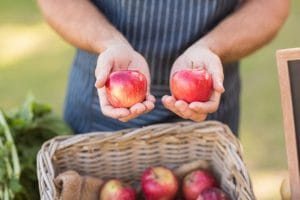

| Online: | |
| Visits: | |
| Stories: |

| Story Views | |
| Now: | |
| Last Hour: | |
| Last 24 Hours: | |
| Total: | |
A REAL Apple a Day
Why to Purchase Local AND Organic This Fall
[This article was previously published in the ffall issue of The Cultivator, Cornucopia’s quarterly newsletter.]
by Linley Dixon, PhD
Farm and Food Policy Analyst at The Cornucopia Institute
 |
Fall, in most regions of the U.S., means an abundance of local apples. They’re likely not as big or picture-perfect as the apples in the grocery store, but local apples, organics especially, pack a taste that is often sweet, tart, and more complex than their conventional counterparts.
Below are just a few of the many reasons why you should buy organically grown apples from your local farmer this season.
1) Escalating concerns about conventional apple farming include reliance on non-renewable resources, reduced biodiversity, water contamination, chemical drift, toxic residues in food, soil degradation, and health risks to farm workers.
A study published in the journal Nature concluded that organic apple production systems have higher soil quality and lower negative environmental impacts than conventional systems.
Organic production systems also produced sweeter apples, had higher profitability, and were more energy efficient. Choosing organic gives you a safer, better product and also protects the environment and the people producing your food.
2) More than 7,500 varieties of apples are known to exist. However, only 15 varieties account for more than 90% of the apples commercially produced in the U.S.
Your local, organic farmer is much more likely to grow rare or heirloom varieties that have been selected over the ages for taste and local conditions, rather than qualities that favor mechanical harvesting, shipping, and long storage life.
These unique, local varieties are also much more likely to be naturally resistant to insects and diseases, reducing the need to spray pesticides.
Many local organic orchards are situated in unique microclimates. Cold nights, hot sunny days, and reduced dependence on irrigation produce concentrated flavors that will knock your socks off.
3) The Environmental Working Group (EWG) rated apples #1 in their 2015 “Dirty Dozen” (conventionally grown fruits and vegetable to avoid due to pesticide contamination).
Pesticide contamination was found on 98% of the 700 apples tested. Common among the residues detected were organophosphate insecticides.
These neurotoxic chemicals were banned for use in homes by the EPA because they are known to cause harm to humans and are linked to low IQ and ADHD in children of farmworkers. In 2016 apples were ranked #2 on the “Dirty Dozen” list, just behind strawberries.
4) Surprisingly, the U.S. imports apples, while apples grown in the U.S. sometimes go unharvested, primarily due to pricing fluctuations and lack of profitability. Though China also exports fresh apples to the U.S., most apples arrive here as concentrates for juice – from a country with widespread pollution and an abysmal food safety record.
A 2014 survey by China’s government found that one-fifth of the country’s farmland was polluted with heavy metals, including mercury, arsenic, cadmium, and nickel. These heavy metals are known to accumulate in produce.
5) Apples are an affordable fruit when bought locally and in-season. Many areas have pick-your-own options, reducing the cost even more and enabling drying or preserving.
6) Buying directly from apple farmers supports local farming families and a diverse local agrarian landscape. Farmers often net a better price when they cut out the middleman and sell directly to consumers, allowing money to stay in your community.
Knowing your farmer creates community, provides the opportunity for production questions, and may even allow for visits to the farm.
The next time you see a smaller or unique-looking apple at your local farmers market, don’t be so quick to judge it by its cover. There’s so much more that its purchase will support beyond the delight to your taste buds!
The post A REAL Apple a Day appeared first on Cornucopia Institute.
Source: http://www.cornucopia.org/2016/10/real-apple-day/


